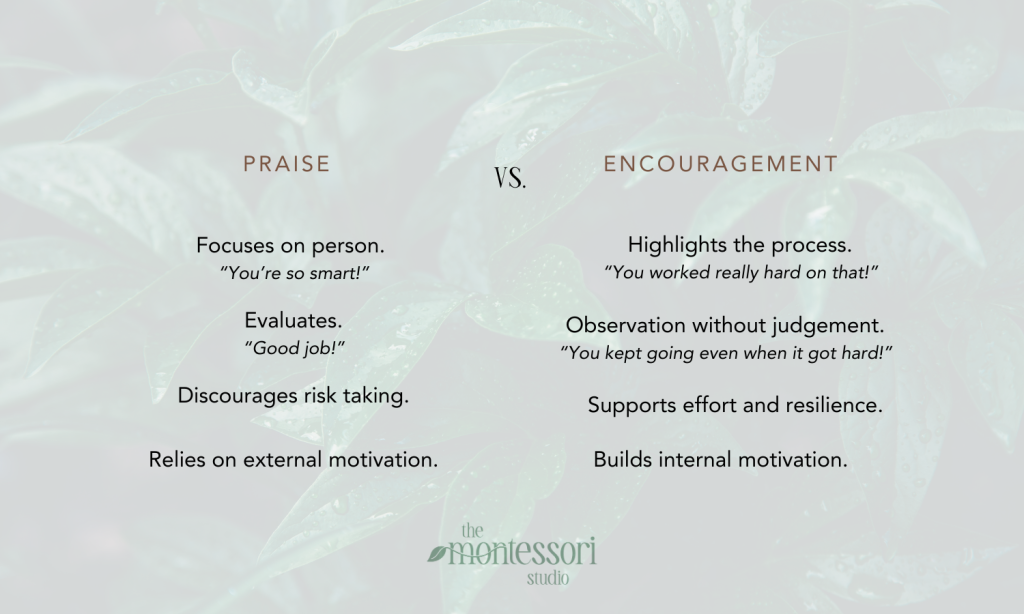As parents, we love seeing our children succeed and are often so very excited when they master a difficult task or create a beautiful piece of art. Of course we want to encourage and uplift our children and phrases like “Good job!” or “You’re so smart!” are nearly automatic (I know they used to be for me).
We have the best intentions when praising our children, but did you know these expressions can inadvertently shift a child’s focus from the joy of learning to seeking external approval? This is why, in Montessori education, we focus on using specific praise and encouragement. What does this look like and how can you start using it in your own home or classroom? Read on to find out more!
Praise in Montessori Education
One of my favorite parts of Montessori philosophy is the idea of observation without judgement. This is a truly beautiful thing because it lets us see children as they are, without expectations, and provide exactly what they need in that moment. Instead of offering generic praise (“you’re so smart!”), we try to acknowledge effort, perseverance, and the learning process… Put simply, we offer encouragement (focusing on effort) instead of praise (which focuses on the individual). This approach nurtures a child’s internal drive and resilience.

“Good Job” Can Be Problematic
Consider this scenario: your child completes a puzzle, and you exclaim, “Great job! You’re so smart!” It’s a natural response- we want to acknowledge our child’s hard work and make them feel good. But while this may boost their confidence momentarily, it can also create a connection between intelligence and your praise. Your child may begin to think you will only be happy with them if they are ‘smart’ (aka- able to complete a puzzle) and may avoid challenges. Research by psychologist Carol Dweck supports this, showing that children praised for intelligence may shy away from difficult tasks, whereas those praised for effort tend to embrace challenges and persist longer.
So, what can we do instead?
Emphasizing Effort and Process
Instead of praising your child for doing something (the product- for example, completing that puzzle or painting that picture), try to focus on your child’s effort. This is a great way to reinforce the value of hard work and determination while also giving your child the loving feedback they crave. Here are some practical ways to implement this:
Instead of saying, “Great job!” try, “I noticed you concentrated really hard to fit those puzzle pieces together.” This acknowledges their effort and attention to detail.
Highlight particular aspects of their work: “You tried several different ways to solve that problem before finding the solution. That shows perseverance.”
Prompt your child to think about their experience: “You worked really hard on that picture- what part did you enjoy the most?”
Focus on growth: “You’ve been practicing your drawing, and I see you’ve added more details this time. Your effort is paying off!”
Children can sense insincerity. Ensure your feedback is heartfelt and specific to their actions, reinforcing their self-esteem authentically.
Reflecting on Our Approach
Like everything worth doing, adopting this approach takes practice and patience. It’s okay to revert to old habits occasionally and saying “Good job!” a time or two will not damage your child. The key is to remain mindful and strive to acknowledge our children’s effort- not just the product of their work. By valuing effort over outcomes, we empower our children to become motivated, resilient learners.
Copyright © 2024-2025 The Montessori Studio | Site Crafted by Felicity Creative